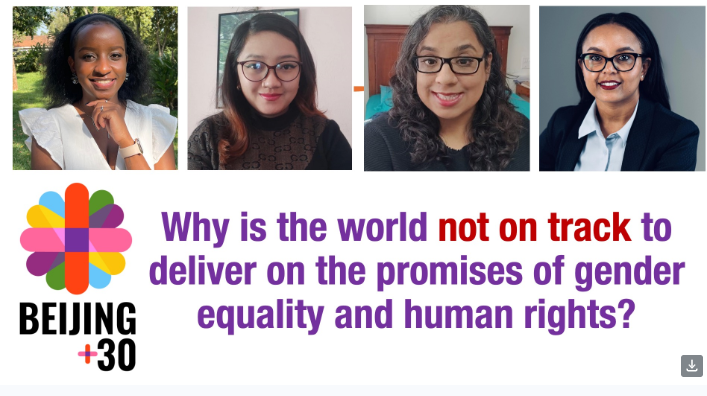Patriarchy Still Thwarts Global Progress on Gender Equality, Say Feminist Advocates
Despite decades of legally binding treaties and global commitments, governments around the world continue to fail in delivering on promises of gender equality — a failure deeply rooted in patriarchal systems that prioritize power, profit, and control over people’s rights, say leading feminist voices.
“Gender inequality is not caused by natural disasters — it is caused by patriarchy,” said Anjali Shenoi of the Asian-Pacific Resource and Research Centre for Women (ARROW) at a recent SHE & Rights session co-hosted by ARROW, APCAT Media, IPPF, CeHDI, WGNRR and CNS. “It is no accident that trade treaties are binding while landmark declarations like the Beijing Declaration remain non-binding.”
The 69th Session of the United Nations Commission on the Status of Women (CSW69) this month marks a critical moment to review progress made since the 1995 Beijing Declaration and Platform for Action, adopted by 189 countries to advance gender equality and women’s rights. However, advocates argue that little has changed on the ground.
“We are living in a time of multiple crises — a poly-crisis world — where anti-rights and anti-gender movements are gaining ground,” Shenoi said. “From colonial legacies and neoliberal globalisation to rising authoritarianism, militarisation, and deepening economic inequality, the rollback on gender rights is real and dangerous.”
The year 2025 also marks the halfway point to achieving the UN Sustainable Development Goals (SDGs), yet progress on gender equality remains far behind.
“Gender equality is the foundation for peace, development and justice. But the world has failed to build that foundation,” said Kavutha Mutua, a Kenyan lawyer and founder of The Legal Caravan. She pointed to harmful contradictions in foreign and domestic policies: “Kenya has progressive gender equality laws, yet it’s also signed the Geneva Consensus Declaration, which limits access to essential reproductive health services.”
From birth, women face societal discrimination. Siyane Aniley, an Ethiopian gender equality expert, illustrated this with a cultural practice: “In many parts of Ethiopia, the birth of a boy is celebrated with seven ululations — a girl only gets three. This difference begins a lifetime of inequality.”
Aniley stressed that gender inequality continues to limit women’s access to education, leadership, and economic opportunity, despite their critical role in national development.
As the global population ages, older women face increased marginalisation. Sanju Thapa Magar, CEO of Ageing Nepal, noted that older women outnumber older men, yet remain underrepresented in policy-making and are more vulnerable to abuse and exclusion.
“Older people, particularly women, are a hidden workforce. They deserve equitable healthcare, recognition of their contributions, and protection from ageism,” said Magar. She called for integrated, age-friendly policies that promote health, independence, and dignity for all.
Activists are calling for a radical reimagining of the global system — one rooted not in profit and patriarchy, but in equity, solidarity, and justice.
“We must dismantle the existing patriarchal world order,” said Shenoi. “Only a feminist future based on rights, care, and justice can secure true gender equality — for all, regardless of age, identity, or geography.”
As the world reflects on 30 years since Beijing and 10 years into the SDGs, the call is louder than ever: hold governments accountable, put people before profit, and end patriarchy’s stranglehold on progress.



